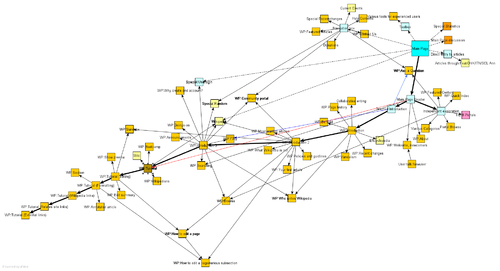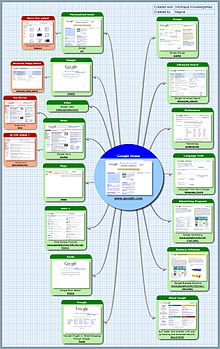Site map: Difference between revisions
"Sitemaps" is upper-case for XML Sitemaps (it's the name of the format) |
|||
| Line 14: | Line 14: | ||
Most search engines will only follow a finite number of links from a page, so if the number of links is very large, the site map may be required so that search engines and visitors can access all content on the site. |
Most search engines will only follow a finite number of links from a page, so if the number of links is very large, the site map may be required so that search engines and visitors can access all content on the site. |
||
== XML |
== XML Sitemaps == |
||
[[Google]] introduced [[Google Sitemaps]] so web developers can publish lists of links from across their sites. The basic premise is that some sites have a large number of dynamic pages that are only available through the use of forms and user entries. The |
[[Google]] introduced [[Google Sitemaps]] so web developers can publish lists of links from across their sites. The basic premise is that some sites have a large number of dynamic pages that are only available through the use of forms and user entries. The Sitemap files can then be used to indicate to a [[web crawler]] how such pages can be found. [[Google]], [[Bing.com|Bing]], [[Yahoo]] and [[Ask.com|Ask]] now jointly support the Sitemaps protocol. |
||
Since MSN, Yahoo, Ask, and Google use the same protocol<ref>[http://www.sitemaps.org/protocol.html Specification] of the common XML format</ref>, having a |
Since MSN, Yahoo, Ask, and Google use the same protocol<ref>[http://www.sitemaps.org/protocol.html Specification] of the common XML format</ref>, having a Sitemap lets the four biggest search engines have the updated page information. Sitemaps do not guarantee all links will be crawled, and being crawled does not guarantee indexing. However, a Sitemap is still the best insurance for getting a search engine to learn about your entire site.<ref>[http://www.google.com/press/pressrel/sitemapsorg.html Joint announcement] from Google, Yahoo, Bing supporting Sitemaps</ref> |
||
XML |
XML Sitemaps have replaced the older method of "submitting to search engines" by filling out a form on the search engine's submission page. Now web developers submit a Sitemap directly, or wait for search engines to find it. |
||
==See also== |
==See also== |
||
Revision as of 09:57, 9 September 2009


A site map (or sitemap) is a list of pages of a web site accessible to crawlers or users. It can be either a document in any form used as a planning tool for web design, or a web page that lists the pages on a web site, typically organized in hierarchical fashion. This helps visitors and search engine bots find pages on the site.
While some developers argue that site index is a more appropriately used term to relay page function, web visitors are used to seeing each term and generally associate both as one and the same. However, a site index is often used to mean an A-Z index that provides access to particular content, while a site map provides a general top-down view of the overall site contents.
Benefits of sitemaps
Site maps can improve search engine optimization of a site by making sure that all the pages can be found. This is especially important if a site uses a dynamic access to content such as Adobe Flash or JavaScript menus that do not include HTML links.
They also act as a navigation aid [1] by providing an overview of a site's content at a single glance.
Most search engines will only follow a finite number of links from a page, so if the number of links is very large, the site map may be required so that search engines and visitors can access all content on the site.
XML Sitemaps
Google introduced Google Sitemaps so web developers can publish lists of links from across their sites. The basic premise is that some sites have a large number of dynamic pages that are only available through the use of forms and user entries. The Sitemap files can then be used to indicate to a web crawler how such pages can be found. Google, Bing, Yahoo and Ask now jointly support the Sitemaps protocol.
Since MSN, Yahoo, Ask, and Google use the same protocol[2], having a Sitemap lets the four biggest search engines have the updated page information. Sitemaps do not guarantee all links will be crawled, and being crawled does not guarantee indexing. However, a Sitemap is still the best insurance for getting a search engine to learn about your entire site.[3]
XML Sitemaps have replaced the older method of "submitting to search engines" by filling out a form on the search engine's submission page. Now web developers submit a Sitemap directly, or wait for search engines to find it.
See also
- SEO
- XML
- Sitemaps, a standard for URL inclusion
- Biositemap, a protocol for broadcasting and disseminating information about computational biology resources (data, software tools and web-services).
- PowerMapper, a tool for automatically creating site maps with thumbnails for each page
References
- ^ Site Map Usability Jakob Nielsen's Alertbox, August 12, 2008
- ^ Specification of the common XML format
- ^ Joint announcement from Google, Yahoo, Bing supporting Sitemaps
External links
- Common Official Website - Jointly maintained website by Google, Yahoo, MSN for an XML sitemap format.
- Sitemap generators at Curlie
- Tools and tutorial Helping to build a cross-systems sitemap generator.
- Free Sitemap Generator - Free Linux/Bash Sitemap Generator.
